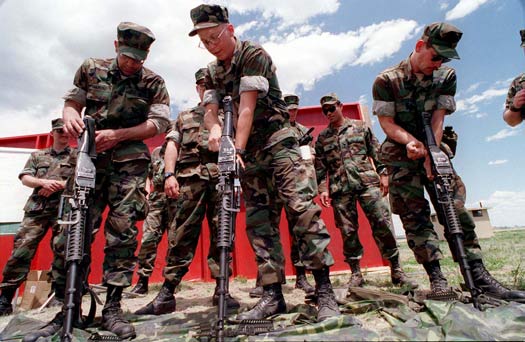Entered into the database on Tuesday, June 07th, 2005 @ 13:59:44 MST
3 June, 2005 Today, I attended an Iraqi activist meeting discussing new forms of resistance
to the occupation. The meeting took place at Women's Will, a women's rights
and social justice organization, and represented were some of the more radical
leftist groups in Baghdad. The bulk of the conference focused around a proposed
boycott of US and Israeli goods that have flooded Iraqi markets since the invasion. A woman opened, "We are now living under another dictatorship, you see
what kind of democracy we have, seems more like bloodacracy. You see what kind
of liberation they brought: unemployment, murder and destruction. We must resist
this, it is the right of any occupied people to resist. Especially the women,
we can use the simplest weapons of resistance, a financial boycott." They
passed around flyers and one translated to, "Don't pay money for the enemy's
weapons". Well educated activists articulated the economic strategies of the US occupation.
"They want to make Iraq a duty-free market for their products and put Iraqi
products out of business." Many of the products are causing health problems,
"They're importing food that's expired and harmful to us. The Ministry
of Health has found items now available that were forbidden because they are
cancerous or cause sterility." Since medication is also difficult to get,
imitation and dangerous drugs are appearing in stores and on the black market.
One man told a story of a diabetic woman who contracted HIV from an insulin
shot. "We'd like to teach our fellow citizens that they can be part of the resistance
by boycotting US and Israeli goods" an activist stated. "The main
reason for the occupation is the economic benefits, so with a boycott simple
people can make lasting change." They insisted that there were plenty of
Iraq products that could replace these cheap imports, and that it is largely
up to Iraqi women to make this change. They plan to launch an information campaign warning Iraqis about the health
problems caused by these products, and making the links between US products
and the occupation. They discussed using the mass media, "But they will
never show it on TV," one activist said, "its controlled by the occupation".
They noted that they will face difficulties combating America's seductive advertising
techniques, but they believe small education campaigns can change many minds.
A woman gave an example of a store in her neighborhood that was selling primarily
US imports even though they'd asked him to stop. "We made a demonstration
and told everyone not to buy there, and it closed". "We can make a website" one activist suggested, "Lets hand out
flyers outside of mosques and universities" another brainstormed. They
were very conscious of the risks they face in publicly organizing this kind
of resistance. Present was a local Imam who had been arrested after he spoke
out against the US occupation. "Soon after I spoke against US advertising
in my Friday speech, US spies came and took me away. I was held for five months
and interrogators told me it was because I had spoken against US products."
This kind of fascist repression is nothing new for Iraqis, they know that freedom
means risking their lives. "The resistance can attack the trucks carrying products through our borders"
an activist pointed out, "but we must do our part and stop buying them."
"We can convince 10 or 20 today, maybe 100 tomorrow," one said hopefully,
"we have to start now to make sure there will be no McDonalds in Iraq."
A woman concluded the conference with a statement of conviction, "It would
be shameful for us to be under occupation and do nothing. It would be torture
for me to stay silent."